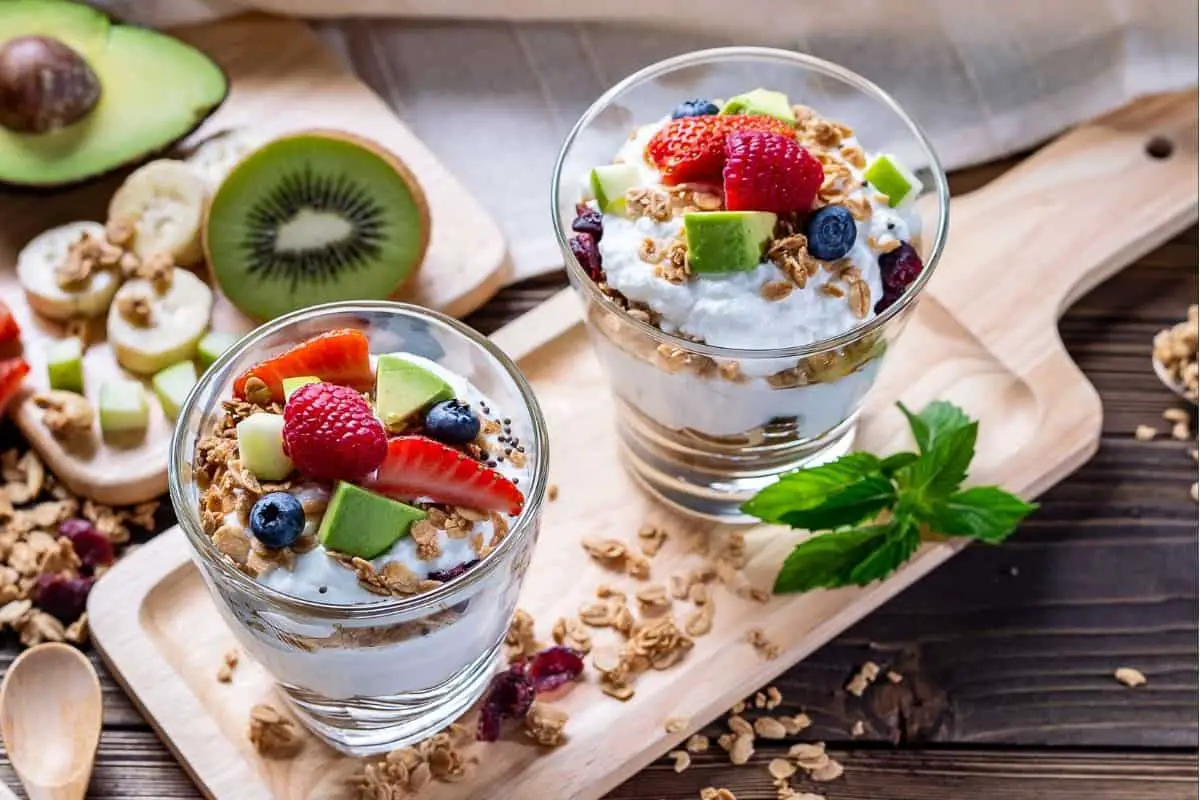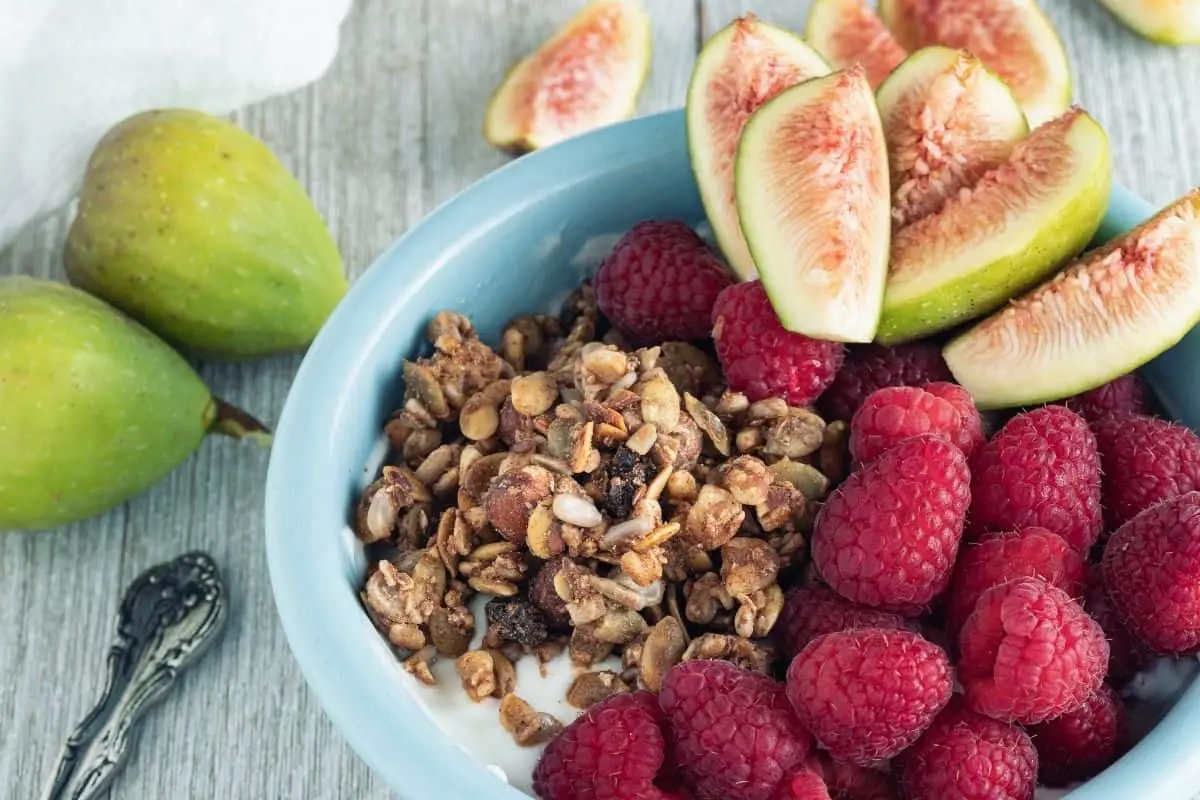What is the healthiest greek yogurt? (Brokendown!)
What is the healthiest greek yogurt? – This question is slightly opinion-based as well as fact-based. Why? Because of brand preference, of course. If you don’t have time to read this whole post, we’ll go ahead and tell you our pick… Fage Greek Yogurt. To find out why we picked Fage over all the over brands on the market today, read on. (And NO, this post was not paid for by Fage. In fact, I highly doubt they even know our little site exists.)
It’s no secret that if you’re looking to improve your diet and lifestyle, one of the best ways to do so is through your breakfast routine. Most Americans consume pancakes, bacon, sugar-loaded cereal, or French toast almost religiously as fuel to start our days but, let’s be honest. These options aren’t particularly healthy by any stretch of the imagination. That’s why in recent years, some alternatives — that have actually been around since forever — have emerged that promise to be much better for our health, and among them, one of the most popular is Greek yogurt.
This essential component of the Mediterranean diet dominates the headlines of hundreds of wellness-related articles, but while jumping on the #healthyfood bandwagon may seem simple, with the hundreds of companies offering “authentic Greek yogurt,” you may feel overwhelmed with so many brands to choose from. After all, spending money on a product that will do you more harm than good and sit in your fridge indefinitely is not a smart move. So, before you rush to your local grocery store, here we’ll show you some of the healthiest greek yogurts out there, as well as everything you need to know about them — just so you don’t drive yourself crazy at the dairy aisle.
Keep in mind that all Greek yogurts will have some nutritional benefits, but some will be more beneficial than others. When looking for the healthiest greek yogurt, it is important to consider various factors, such as sugar, additives, quality of ingredients used, etc. In this blog post, we will explore some of the healthiest options available on the market today.
What are the health benefits of Greek yogurt?
Why did everyone start talking about Greek yogurt all of a sudden? Is it just another trend among fitness bloggers, or is it truly a healthy option? Well, we know that Greek yogurt may not be everyone’s cup of tea, but trust us, once you know what its health benefits are, it’s sure to become your favorite cup of yogurt.
One word: probiotics. You’ve probably already heard this word from those catchy Activia commercials from 2010 featuring Jamie Lee Curtis, but for those of you who don’t know what they are, let us introduce them to you. Probiotics are essentially friendly bacteria — no, they won’t make you sick, as other bacteria do — that help restore the natural balance of bacteria in your gut and, in general, improve digestive health. Among those bacteria are Streptococcus thermophilus, Bifidobacterium lactis, and the most famous of them all — the one that all yogurts are made with —, Lactobacillus bulgaricus. They are the biggest benefit of Greek yogurt, hands down.
Other significant health benefits of Greek yogurt are that due to its high nutritional value, its consumption is associated with improving the cardiovascular system, preventing osteoporosis and other bone diseases due to its good calcium content, and improving muscle recovery after heavy physical training, thanks to its high protein content. As you can see, Greek yogurt doesn’t play around when it comes to nutrients.
You thought its benefits ended here? Nope! Another of Greek yogurt’s nutritional wonders is that it is low in lactose compared to other dairy products, which means that some people with lactose intolerance can tolerate it. The straining process that Greek yogurt goes through removes some lactose from the product, and the fermentation process maintains live, active cultures that also help break down its lactose content. However, it is important to consider the level of lactose intolerance of each person, as some may experience side effects.
So, is Greek yogurt actually a healthy food? OFC it is!

What To Avoid When Buying Greek Yogurt?
What are some of the bright red flags you may find in popular so-called “Greek yogurts”? Stabilizers, thickeners, weird words you don’t recognize, and other additives, like added sugar.
Let’s face it: most well-known yogurt brands are more of a dessert than a healthy snack. Some time ago, part of the Greek yogurt industry decided to combat the traditional sour taste of this probiotic-rich product by adding sugar — which is why many have too much of it — but as addictive as that sweet chocolate-flavored yogurt you love so much is, it’s best to avoid it. Added sugars may increase the risk of heart disease, accelerate tooth decay, and a host of other health problems, so keep any cup containing anything that ends with an “ose” — we’re givin’ you the side-eye, sucrose — away from your fridge.
Basically, when it comes to yogurt, keeping it healthy means keeping it simple.
Non-Fat or Full Fat Greek yogurt?
Now that you know what to avoid when buying greek yogurt let’s say you decided to grab your keys and head to your nearest grocery store to get yourself a nice six-pack of one of the Mediterranean diet’s darlings. You enter the grocery store, make your way to the dairy aisle, and realize that a) you still don’t know what is the healthiest greek yogurt brand out there — so keep scrolling! —, and b) yogurts are not only labeled by their type, but also whether they are non-fat or full fat. Choosing between those two varieties may seem difficult to do, but TBH, it’s not at all.
Long story short, they are somewhat similar, except that the full-fat version is made with whole milk, while the non-fat is made with reduced-fat milk (skim milk), which, of course, means that the final product also has reduced fat or no fat at all. “And what about the difference in vitamins and nutrients?” you may ask. Well, there’s not much of a difference, actually. Both varieties offer roughly the same amount of calcium, potassium, and protein.
While the most notable difference is that the full-fat version has more calories than the non-fat version, choosing between the two depends entirely on your lifestyle and health-related goals. If you currently are and want to stay in a calorie deficit, sure, go for a non-fat yogurt, but if you want a standalone snack, then full-fat Greek yogurt will become your best friend.
Plus, full-fat is a good option if you want to eradicate the unhealthy snacking habit from your life, because it will make you feel full faster and for longer. Oh, and it also tends to have a richer mouthfeel, for those of you who are into unctuous, creamy stuff.
The worst Greek yogurts for your health
Before we show you the candidates in the “best healthy Greek yogurt” category, we feel we have to start with the worst Greek yogurts for your health, just so you’re aware of which brands you should avoid at all costs.
ZOI’s minimalist packaging certainly has the ability to convey a sense of calm and reliability, especially since, at first glance, it doesn’t mention that its vanilla-flavored Greek yogurt contains added sugars and a pitiful amount of protein, only 8g. The worst part? To get to those 8g, they had to add a milk protein concentrate. This is very strange considering that Greek yogurts are naturally high in protein, but hey, that’s up to them.
A warning needs to be given first to talk about Greek Gods’ fat-free plain Greek yogurt: Zeus definitely didn’t build his muscles on this yogurt. Its sugar-to-protein ratio is not balanced, as it has more sugar (14g) than protein (only 9g) and contains two extra ingredients that may cause gut-related side effects in some people, which are inulin and pectin. It’s not a yogurt that will kill you if you ingest it or something, but is it worth your money? Absolutely not.
Last but not least, — we’re sorry to say this, Jamie Lee Curtis — Activia. Yes, their vanilla-flavored fat-free Greek yogurt has a very good probiotic content, but… 21g of sugar? Added sugars? Modified food starch? That’s a no-no for us. As you’ll see below, you can absolutely have your probiotics and eat a healthy product at the same time, so let’s leave these guys aside and move on to the healthiest Greek yogurts out there.

Top Five Healthiest Greek Yogurt Brands
Yes, Greek yogurt is healthy, but not all Greek yogurt brands are. So, which are the brands that only deal with a few ingredients, no additives, low sugar levels, and high protein content? Finally, here they are! You can easily find these brands at your local grocery store or, if not, online at Amazon, but where you get them is the least important thing — what really matters is that once you get one of these cups in your hands, you will really know what THE healthiest Greek yogurt is.
Fage Total 2% Greek Yogurt
- Per Serving (150g): 100 calories
- 3g fat
- 5g sugar
- 15g protein
- L. Bulgaricus, S. Thermophilus, L. Acidophilus, Bifidus, L. Casei
- US$ 0.99
Some people say Fage’s Total 2% Greek yogurt is “everything you want a Greek yogurt to be,” and others say it is “one of the-if not the-best-tasting Greek yogurt available,” and we couldn’t agree more. Choosing a healthy diet doesn’t require sacrificing flavor, and Fage does a superb job of giving us a rich and creamy yogurt with just the right amount of sourness. However, the best thing about this Greek yogurt is not its flavor, but its nutritional profile: low sugar, a good source of protein, and no artificial flavors! Plus, it’s made from milk from cows that have been fed non-GMO feed. What more could you ask for?
Oikos Plain Nonfat Greek Yogurt
- Per Serving (150g): 80 calories
- 0g fat
- 6g sugar
- 15g protein
- S. Thermophilus, L. Bulgaricus
- US$ 1.28
Sometimes you want a snack in the middle of the day, but that doesn’t necessarily mean you want to eat a ton of calories to satisfy your hunger. So, what should you do? Find some Oikos plain non-fat Greek yogurt! Although this Greek yogurt is not part of the “triple zero” variety of Oikos, it looks like it is since it contains zero fat, zero added sugar, and zero artificial sweeteners or flavors. Talking about flavor, there are a lot of positive reviews in that department — it’s not as tangy as other yogurts, but it definitely maintains some of the characteristic profiles of all Greek yogurts, accentuating freshness and richness above everything else. We know, we got a little poetic with that last line, but this yogurt is worth it.
Chobani Non-Fat, Plain
- Per Serving (150g): 80 calories
- 0g fat
- 4g sugar
- 14g protein
- S. Thermophilus, L. Bulgaricus, L. Acidophilus, Bifidus, L. Casei
- US$ 0.99
Ah, Chobani. This is America’s leading brand for Greek yogurt, and from that statement, one would think that their products are full of sugar and unrecognizable ingredients. We mean, the more “underground,” the better, right? Well, not really. We’re sorry to shoot down the beliefs of some of the more profound yogurt connoisseurs, but Chobani’s nonfat plain Greek yogurt is much better than several “underground” brands. Its only 4g of sugar and low calories make it a very healthy snack, perfect for any occasion. However, in terms of taste, Chobani’s representative falls into limbo. Some reviewers claim its texture is soft, too soft, others say its flavor reminds them more of sour cream than Greek yogurt, and others say its texture and taste are perfect. We love it, but you just have to try it and draw your conclusions.
Wallaby Aussie Whole Milk No Sugar Added Strawberry Greek Yogurt
- Per Serving (150g): 130 calories
- 5g fat
- 7g sugar
- 11g protein
- L. Acidophilus, L. Bulgaricus, S. Thermophilus, Bifidus, L. Paracasei
- US$ 1.13
While this strawberry-flavored whole milk Greek yogurt from Wallaby is not a heavy hitter in the protein department, we all know the sugar bomb that can sneak into flavored yogurts, and Wallaby does an excellent job of creating a flavored Greek yogurt that doesn’t have excessive amounts of sugar. As an anecdote, when we were doing our research for this post, most healthy — and not so healthy — yogurts only had vanilla flavor, so you can imagine the relief we felt knowing that this Greek yogurt has a different, and tasty, flavor. Plus, they have a pretty neat feature on their website which lets you know where you can find their products — any, specifically — depending on your location. If you’ve never tried Aussie-style yogurt before, now you have no excuse not to!
Stonyfield 100% Grass-Fed Greek Yogurt
- Per Serving (150g): 130 calories
- 5g fat
- 4g sugar
- 14g protein
- S. Thermophilus, L. Bulgaricus, L. Acidophilus, Bifidus, L. Paracasei, L. Rhamnosus
- ???
If you like all things organic, you’d better try Stonyfield’s organic Greek yogurt as soon as possible, as it’s made with 100% whole milk from only grass-fed cows and non-GMO Project Verified, USDA Organic, kosher and gluten-free ingredients. These may sound like a lot of certifications, unnecessary even, but these are what make this Greek yogurt superior to any other organic yogurt, and for good reason — Stonyfield are pioneers in the organic Greek yogurt game. It also contains more omega-3s than its competitors, is low in sugar and high in protein — the winning combo in any yogurt —, and taste-wise, it’s creamy and smooth. However, if you plan to try it, keep in mind that currently, Stonyfield only offers their grass-fed Greek yogurt in a full-fat option.

Is Greek Yogurt Better Than Regular? Greek Yogurts vs. Regular Yogurts
Both regular yogurt and Greek yogurt are products derived from milk, but although they share the same origin, they have noticeable differences.
Those who have eaten both types of yogurt may notice that the taste and texture vary significantly in both. Greek yogurt has a sourer taste — honestly, it has a terrible reputation in the taste bud category — and is naturally thicker than its regular counterpart. This is because, during the manufacturing process, Greek yogurt is strained, while regular yogurt is not, which also influences the nutritional content of both types of yogurt.
In terms of vitamins, there is no major difference, but it is worth noting that Greek yogurt tends to have less sugar and more protein than regular yogurt. However, regular yogurt does contain a bit more calcium and less fat than the Greek variety — when compared to full-fat Greek yogurts, of course.
The bottom line is that both yogurts can be healthy, but if you ask us, we’d say Greek yogurt is superior. The extra protein, thickness, and semi-lack of sugars make it the ultimate secret ingredient that complements any healthy diet!
Fun-Fact: Did you know that yogurt originated as a happy accident? That’s right! Some historians claim that the first yogurts were created by spontaneous fermentation when some bacteria or enzymes accidentally lodged inside pouches made from different animals’ stomachs in which the Mesopotamians carried fresh milk.
How to choose the healthiest Greek yogurt brand
There are several factors that you need to consider when choosing a Greek yogurt brand, but in a nutshell, here are the most important ones:
- Read the ingredients. The packaging of most Greek yogurts available in grocery stores is usually full of misleading advertising that tries to get us to buy the product, but the ingredient list is where the truth really comes out. It’s the only part of the yogurt that will tell you if it’s a quality yogurt or if, on the other hand, it’s a far cry from what a real Greek yogurt actually is. BTW, if the sugar level is not less than 12g per serving, you might need to check on other brands.
- Compare and contrast. Do not just go for the cheapest or the most colorful package. You need to compare the brands in terms of their ingredients and nutritional value, so check the levels of protein and other beneficial nutrients.
- Read reviews from the internet. Although this is just Greek yogurt, not a car or a laptop, researching the food you plan to consume is important. Product reviews can provide you with insight and can help you to weed out the good from the bad brands.
Greek Yogurt FAQs
Can I Lose Weight Eating Greek yogurt?
Let’s get one thing straight right off the bat: Greek yogurt won’t make you lose weight by itself, but it will help you in the process due to its high amount of protein. Why? Because protein is the macronutrient that promotes fullness the most, which reduces the appearance of excessive food cravings. P.S: while Greek yogurt can definitely help you on your weight loss journey, remember that we can’t just eat our way out of unhealthiness. An optimal weight loss plan should include a diet change and an exercise routine — both things complement each other!
Which Greek Yogurt Is The Healthiest?
The answer to this question is not simple. As mentioned above, going into the dairy section of any grocery store is like diving into a plethora of varieties, presentations, and yogurt flavors. But one thing is for sure: the best healthy greek yogurt will depend on your dietary needs and goals. If you are looking for a low-calorie option, then you should go for one with less sugar and fat content, and if you want something with probiotics, then you should look for greek yogurts that contain live cultures.
However, if you want to know what is the healthiest Greek yogurt to eat from the brands we gathered, we have to give the crown to Fage. It has a good balance of everything that makes a yogurt healthy — low sugar content, not too many calories, good source of protein, and high presence of probiotics —, and best of all, it’s 100% available in any supermarket.

Does Greek yogurt contain probiotics?
Most Greek yogurts contain probiotics, however, we have to point out that there are some Greek yogurt brands that practice the equivalent of greenwashing on their products (yogurtwashing?). They label each yogurt as “containing live cultures”, but in reality, during the manufacturing process, they heat treat the yogurt to kill the beneficial bacteria — that are so helpful to our bodies — just to extend the shelf life of their product.
Sure, we all want the food we buy to last a long time in our fridge, but if that means killing off the good stuff that actually benefits us, it’s not worth it. To avoid being a victim of yogurtwashing, make sure you buy yogurt from reliable brands, and if you can, look for manufacturing details on their websites.
Is Greek Yogurt High In Protein?
Greek yogurt is very high in protein, in fact, it packs almost twice as much protein as regular yogurt. This is because its straining process is different, which is done several times to remove excess whey, lactose, and other liquids, thus producing a thicker and protein-rich yogurt (and creamier, IOHO).
What is a healthy serving of Greek yogurt?
reek yogurt is a healthy addition to any diet, that doesn’t mean you should have it 24/7. Perhaps the yogurt you bought this morning is so good that it feels like every time you open the fridge, it whispers “eat meeeeee“, but the truth is that a healthy serving of Greek yogurt is between one to two cups per day. You can enjoy it in the morning, afternoon or evening, but regardless of the time of day you decide to do it, the most important thing is to avoid overindulging.
Is plain Greek yogurt the healthiest
Plain Greek yogurt will always be a standout in the Greek yogurt world as it doesn’t contain added sugars or artificial colors, meaning that it is (seemingly) the healthiest option. However, while some flavored Greek yogurts contain nasty added sugars and hideous artificial colors, that’s not always the case. For instance, Wallaby’s strawberry Greek yogurt is a great alternative if you want to get into the Greek yogurt realm without having to deal with its signature sourness — or unhealthy ingredients.
Plus, fruit is always your greatest ally. If you want to go for the plain variety, you can chop up bananas, strawberries, peaches — or any fruit you can think of — and mix them with your go-to yogurt. This will make plain Greek yogurt taste, well, not so plain.

So… Which brand of Greek yogurt is the best?
Before we mention what is the healthiest greek yogurt to eat — in our opinion —, we’ll slip in a friendly reminder: the best yogurt brand will depend on your personal needs. Yes, we know we’ve said this several times already, but we just want to make it clear that for you to get your best dairy friend you need to try and see which one best suits your taste preference, ingredients, and nutritional profile.
Now that that’s out of the way, on to the real deal! While all of the yogurt brands we discussed above are the example that every Greek yogurt brand should follow, there is one that knocked the others out of the park, and that’s Fage.
It’s not completely fat-free, but this yogurt simply has the perfect balance of great taste, amazing texture, excellent probiotics, low sugar, good protein levels, and very few calories. It is simply the epitome of yummy and healthy, but inexpensive!







